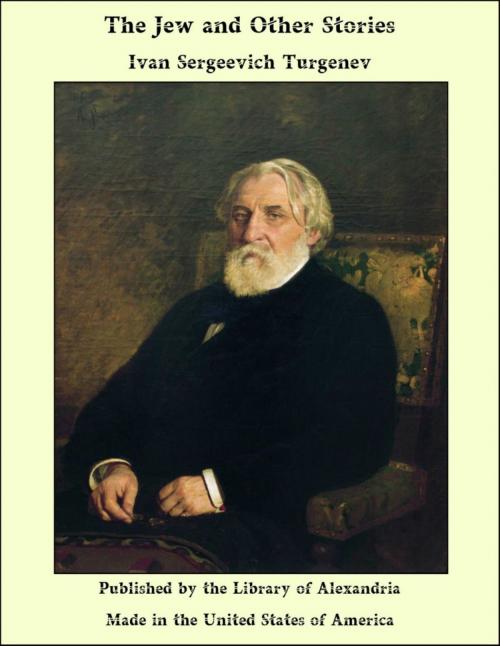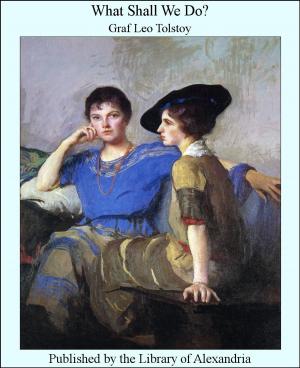The Jew and Other Stories
Nonfiction, Religion & Spirituality, New Age, History, Fiction & Literature| Author: | Ivan Sergeevich Turgenev | ISBN: | 9781465590039 |
| Publisher: | Library of Alexandria | Publication: | March 8, 2015 |
| Imprint: | Language: | English |
| Author: | Ivan Sergeevich Turgenev |
| ISBN: | 9781465590039 |
| Publisher: | Library of Alexandria |
| Publication: | March 8, 2015 |
| Imprint: | |
| Language: | English |
In studying the Russian novel it is amusing to note the childish attitude of certain English men of letters to the novel in general, their depreciation of its influence and of the public's 'inordinate' love of fiction. Many men of letters to-day look on the novel as a mere story-book, as a series of light-coloured, amusing pictures for their 'idle hours,' and on memoirs, biographies, histories, criticism, and poetry as the age's serious contribution to literature. Whereas the reverse is the case. The most serious and significant of all literary forms the modern world has evolved is the novel; and brought to its highest development, the novel shares with poetry to-day the honour of being the supreme instrument of the great artist's literary skill. To survey the field of the novel as a mere pleasure-garden marked out for the crowd's diversion—a field of recreation adorned here and there by the masterpieces of a few great men—argues in the modern critic either an academical attitude to literature and life, or a one-eyed obtuseness, or merely the usual insensitive taste. The drama in all but two countries has been willy-nilly abandoned by artists as a coarse playground for the great public's romps and frolics, but the novel can be preserved exactly so long as the critics understand that to exercise a delicate art is the oneserious duty of the artistic life. It is no more an argument against the vital significance of the novel that tens of thousands of people—that everybody, in fact—should to-day essay that form of art, than it is an argument against poetry that for all the centuries droves and flocks of versifiers and scribblers and rhymesters have succeeded in making the name of poet a little foolish in worldly eyes. The true function of poetry! That can only be vindicated in common opinion by the severity and enthusiasm of critics in stripping bare the false, and in hailing as the true all that is animated by the living breath of beauty. The true function of the novel! That can only be supported by those who understand that the adequate representation and criticism of human life would be impossible for modern men were the novel to go the way of the drama, and be abandoned to the mass of vulgar standards.
In studying the Russian novel it is amusing to note the childish attitude of certain English men of letters to the novel in general, their depreciation of its influence and of the public's 'inordinate' love of fiction. Many men of letters to-day look on the novel as a mere story-book, as a series of light-coloured, amusing pictures for their 'idle hours,' and on memoirs, biographies, histories, criticism, and poetry as the age's serious contribution to literature. Whereas the reverse is the case. The most serious and significant of all literary forms the modern world has evolved is the novel; and brought to its highest development, the novel shares with poetry to-day the honour of being the supreme instrument of the great artist's literary skill. To survey the field of the novel as a mere pleasure-garden marked out for the crowd's diversion—a field of recreation adorned here and there by the masterpieces of a few great men—argues in the modern critic either an academical attitude to literature and life, or a one-eyed obtuseness, or merely the usual insensitive taste. The drama in all but two countries has been willy-nilly abandoned by artists as a coarse playground for the great public's romps and frolics, but the novel can be preserved exactly so long as the critics understand that to exercise a delicate art is the oneserious duty of the artistic life. It is no more an argument against the vital significance of the novel that tens of thousands of people—that everybody, in fact—should to-day essay that form of art, than it is an argument against poetry that for all the centuries droves and flocks of versifiers and scribblers and rhymesters have succeeded in making the name of poet a little foolish in worldly eyes. The true function of poetry! That can only be vindicated in common opinion by the severity and enthusiasm of critics in stripping bare the false, and in hailing as the true all that is animated by the living breath of beauty. The true function of the novel! That can only be supported by those who understand that the adequate representation and criticism of human life would be impossible for modern men were the novel to go the way of the drama, and be abandoned to the mass of vulgar standards.















